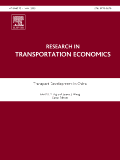
Research in Transportation Economics
Scope & Guideline
Fostering Scholarly Dialogues in Transportation Economics
Introduction
Aims and Scopes
- Transportation Economics:
The journal primarily explores economic theories and models related to transportation, addressing issues such as pricing, market structures, and economic impacts of transportation policies. - Sustainability and Environmental Impact:
A significant focus is placed on sustainable transportation practices, including the evaluation of environmental impacts, carbon emissions, and the adoption of green technologies. - Urban Mobility and Planning:
Research regarding urban transportation systems, including public transit, micromobility, and land use interactions, is a core area of interest, providing insights into effective urban mobility planning. - Behavioral and Social Aspects of Transportation:
The journal examines the behavioral patterns and preferences of travelers, including demographic influences, travel choices, and the social implications of transportation systems. - Innovations in Transportation Technology:
The journal highlights advancements in transportation technologies, including autonomous vehicles, electric mobility, and smart logistics, assessing their economic viability and societal impacts. - Policy Analysis and Regulatory Frameworks:
Research addressing the effectiveness of transportation policies, regulatory frameworks, and governance structures is also a key area, aiming to inform better decision-making in transportation management.
Trending and Emerging
- Decarbonization and Green Transport Initiatives:
There is a growing emphasis on research related to decarbonization strategies and the economic implications of transitioning to green transport solutions, such as electric vehicles and sustainable logistics. - Integration of E-commerce and Urban Mobility:
Research exploring the intersection of e-commerce and urban transportation is on the rise, particularly in the context of last-mile delivery solutions and their economic impacts. - Impact of COVID-19 on Transportation Behavior:
Emerging studies are increasingly focused on the long-term effects of the COVID-19 pandemic on travel behavior, public transport usage, and overall transportation systems. - Advanced Data Analytics and Machine Learning:
There is a notable trend towards utilizing advanced data analytics and machine learning techniques to analyze transportation systems, enhance decision-making, and improve operational efficiency. - Equity and Accessibility in Transportation:
Research addressing equity and accessibility issues in transportation systems is gaining traction, focusing on underserved communities and the socio-economic impacts of transport policies.
Declining or Waning
- Traditional Freight Transportation Models:
Research centered on conventional freight transportation models has seen a decline as newer, more innovative approaches and technologies gain traction. - Static Transportation Planning:
There is a noticeable reduction in studies focused on static planning approaches, as dynamic, real-time models and simulation techniques become more prevalent. - Regional Transportation Studies:
The journal has seen a waning interest in studies that focus exclusively on regional transportation issues without considering broader, interconnected systems and global impacts. - Single-Modal Transportation Research:
Research that examines transportation modes in isolation is becoming less common, as integrated and multimodal transportation approaches are increasingly favored. - Cost-Benefit Analysis in Isolation:
The traditional approach of conducting standalone cost-benefit analyses without incorporating broader socio-economic impacts is declining, as researchers seek more holistic evaluations.
Similar Journals

JOURNAL OF TRANSPORT ECONOMICS AND POLICY
Exploring the intersection of economics and transport policy.JOURNAL OF TRANSPORT ECONOMICS AND POLICY is a prominent academic journal published by the University of Bath, dedicated to advancing the field of transport economics and related policy issues. Since its inception, this journal has been a pivotal platform for disseminating high-quality research, with a focus on economic theories, analytical methods, and policy implications within the transport sector. With a robust historic timeline of publication spanning from 1982 to the present, the journal boasts a commendable Q3 ranking in esteemed categories including Economics and Econometrics, Management, Monitoring, Policy and Law, and Transportation as of 2023. Although currently not open access, it remains an essential resource for researchers and professionals keen on exploring intricate economic mechanisms that drive transport systems globally. The journal's contributions are crucial for enhancing policy development and fostering informed decision-making among stakeholders, ensuring its significance in shaping future transport economics discourse.
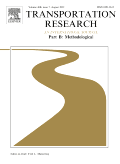
TRANSPORTATION RESEARCH PART B-METHODOLOGICAL
Elevating transportation science through cutting-edge methodologies.TRANSPORTATION RESEARCH PART B - METHODOLOGICAL is a premier academic journal published by Pergamon-Elsevier Science Ltd, focusing on innovative methodologies and solutions in the field of transportation research. With a prestigious Q1 ranking in key categories, including Civil and Structural Engineering, Management Science and Operations Research, and Transportation, the journal demonstrates its vital role in advancing the academic discourse and practical applications within these domains. Boasting an impressive Scopus ranking of #20 in Civil and Structural Engineering and #15 in Transportation, it attracts high-quality research that informs policy, enhances transport systems, and contributes to sustainable development. The journal serves as a critical platform for researchers, practitioners, and students alike to disseminate findings that push the boundaries of transportation science. With a publication history dating from 1979 to 2024, TRANSPORTATION RESEARCH PART B is dedicated to fostering interdisciplinary collaborations and inspiring new methodologies to tackle complex transportation challenges. As a vital resource for the academic community, it leverages a broad international perspective to enrich the field and facilitate cutting-edge research.
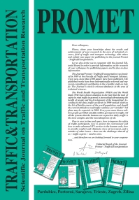
Promet-Traffic & Transportation
Connecting Research with Real-World Transportation SolutionsPromet-Traffic & Transportation is a premier open-access journal published by SVEUCILISTE U ZAGREBU, FAKULTET PROMETNIH ZNANOSTI, dedicated to advancing the fields of traffic and transportation engineering. Since its inception in 2001, the journal has played a crucial role in disseminating innovative research and best practices within its scope, which embraces civil and structural engineering, urban studies, and various engineering disciplines. With a Q3 ranking in multiple categories as of 2023, including Civil and Structural Engineering and Ocean Engineering, Promet is positioned to provide valuable insights into contemporary challenges and solutions in transportation systems. Open-access since 2013, the journal ensures that all published articles are freely available to researchers, practitioners, and students globally, fostering a collaborative environment for knowledge exchange. Based in Croatia, it serves as an essential platform for interdisciplinary studies that influence the future of traffic and transportation policies and practices.
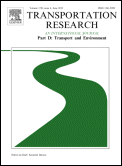
TRANSPORTATION RESEARCH PART D-TRANSPORT AND ENVIRONMENT
Pioneering insights for a sustainable transport landscape.Transportation Research Part D: Transport and Environment is a premier academic journal published by Pergamon-Elsevier Science Ltd, dedicated to advancing knowledge in the fields of civil and structural engineering, environmental science, and transportation. With an impressive Impact Factor and ranked in the Q1 category for 2023 across multiple disciplines, this journal serves as a critical resource for researchers, professionals, and students interested in the intersections of transportation systems and environmental challenges. Spanning the years from 1996 to 2024, the journal features innovative studies that address pressing transportation and environmental issues, fostering interdisciplinary collaboration and insights. Although not an open-access journal, articles published in Transportation Research Part D are accessible through institutional databases, making significant contributions to academia and practice in the UK and globally. Scholars looking to stay at the forefront of research related to sustainable transport solutions and their implications for the environment will find this journal indispensable.

Journal of Transport and Land Use
Fostering Interdisciplinary Dialogue for Better MobilityJournal of Transport and Land Use, published by the University of Minnesota's Center for Transportation Studies, is a prominent open-access journal that has been disseminating high-quality research since its inception in 2008. Focused on the intersections of transportation, urban studies, and land use planning, this journal plays a critical role in addressing contemporary challenges in mobility and spatial development. With an impressive categorization in 2023 as Q2 in Geography, Planning and Development and Transportation, and Q1 in Urban Studies, it stands out with its Scopus rankings that position it within the top quartiles of significant disciplines, reflecting its impact and relevance. Catering to researchers, professionals, and students alike, the Journal of Transport and Land Use seeks to foster interdisciplinary dialogue and collaboration through its comprehensive exploration of the complex relationships between transportation systems and land use policies. With its ongoing commitment to facilitating knowledge dissemination and open access, this journal serves as a vital resource for advancing scholarly discourse in the field.
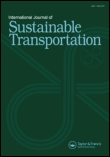
International Journal of Sustainable Transportation
Leading the Charge in Sustainable Transport ResearchInternational Journal of Sustainable Transportation, published by Taylor & Francis Inc, stands at the forefront of research in sustainable mobility, addressing critical challenges within the fields of engineering, environmental science, and urban planning. With ISSN 1556-8318 and E-ISSN 1556-8334, this journal is recognized for its exceptional quality, evidenced by its Q1 rankings across multiple categories including Automotive Engineering, Civil and Structural Engineering, Environmental Engineering, and Transportation, as well as a notable presence in Renewable Energy and Sustainability. Its impact is further amplified by impressive Scopus rankings, securing top positions in various fields, ensuring that it serves as a pivotal resource for researchers, practitioners, and policymakers dedicated to advancing sustainable transportation solutions. The journal actively disseminates cutting-edge research that informs sustainable practices worldwide, thus contributing to the development of greener transportation methods. As it continues its mission from 2007 to 2024, International Journal of Sustainable Transportation remains essential for anyone looking to explore innovative approaches to the transportation challenges of our time.

Transportation Research Interdisciplinary Perspectives
Shaping Tomorrow's Transportation Landscape TogetherTransportation Research Interdisciplinary Perspectives, published by ELSEVIER, serves as a leading journal in the field of transportation research, with a pronounced interdisciplinary approach that fosters dialogue between diverse fields including automotive engineering, civil and structural engineering, and urban studies. Since its inception in 2019, the journal has swiftly gained recognition, achieving a prestigious Q1 classification across multiple relevant categories such as Environmental Science, Geography, and Management Science in 2023, reflecting its robust impact factor and significance within the academic community. By offering Open Access since its launch, the journal ensures broad accessibility to critical research findings, supporting global collaboration and innovation. Recognized globally with impressive Scopus rankings—such as #4 in Urban Studies and #6 in Automotive Engineering—this journal is a vital resource for researchers, professionals, and students committed to driving advancements within the complex interplay of transportation systems. Whether exploring sustainable practices, infrastructural innovations, or socio-economic implications of transport policies, Transportation Research Interdisciplinary Perspectives is at the forefront of shaping the future of mobility and transportation science.
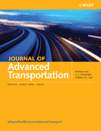
JOURNAL OF ADVANCED TRANSPORTATION
Exploring Solutions for Tomorrow's Mobility ChallengesJOURNAL OF ADVANCED TRANSPORTATION, published by WILEY-HINDAWI, stands as a pivotal platform in the fields of automotive engineering, computer science applications, economics, mechanical engineering, and strategy and management. With an impressive impact factor and positioned in the Q2 quartile across multiple categories as of 2023, this open-access journal offers researchers, professionals, and students unparalleled opportunities to disseminate and access cutting-edge research. Operating under an open access model since 2017, the journal fosters global collaboration and knowledge exchange, encouraging innovative solutions to contemporary transportation challenges. Its comprehensive scope, spanning converged years from 1979 to 2024, reflects its commitment to addressing the evolving landscape of transport systems worldwide. Researchers from diverse disciplines are invited to contribute transformative studies that advance the field and inspire future endeavors.
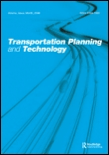
TRANSPORTATION PLANNING AND TECHNOLOGY
Transforming Transportation Through Cutting-Edge InsightsTransportation Planning and Technology is a prestigious academic journal dedicated to advancing the fields of transportation planning and technology. Published by Taylor & Francis Ltd, this journal serves as a critical platform for disseminating high-quality research and innovative practices in the context of urban and regional transportation systems. With an ISSN of 0308-1060 and an E-ISSN of 1029-0354, the journal has established a significant foothold since its inception in 1972, spanning through to 2024. Recognized in the Q2 category of Geography, Planning and Development and the Q3 category of Transportation in the 2023 rankings, it reflects a solid impact factor supported by its Scopus classifications, holding a rank of #270/821 in Geography, Planning and Development and #72/141 in Transportation. Researchers, professionals, and students alike benefit from the journal's comprehensive scope, which encompasses theoretical aspects, practical applications, and policy implications related to transportation systems. As an essential resource in the field, it invites contributions that enhance our understanding of the complexities in transportation planning, making it a must-read for those engaged in related studies.

Frontiers in Future Transportation
Transforming Tomorrow's TravelFrontiers in Future Transportation, published by FRONTIERS MEDIA SA, is an influential Open Access journal that has been at the forefront of research since its inception in 2020. With an ISSN of N/A and E-ISSN 2673-5210, this journal provides a comprehensive platform for cutting-edge studies in the field of transportation, encompassing urban studies, automotive engineering, and innovative control systems. Ranking impressively in Scopus with notable percentiles—61st in Urban Studies, 51st in Automotive Engineering, and others—it underscores its significance within the scholarly community. The journal is committed to advancing the discourse surrounding sustainable and smart transportation solutions that address the challenges of future mobility. By offering unrestricted access to research, it invites contributions from researchers, professionals, and students alike, fostering collaboration and disseminating knowledge pivotal to transforming transportation systems globally. With its headquarters based in Lausanne, Switzerland, Frontiers in Future Transportation is poised to make substantial contributions to the evolving landscape of transport research through 2024 and beyond.